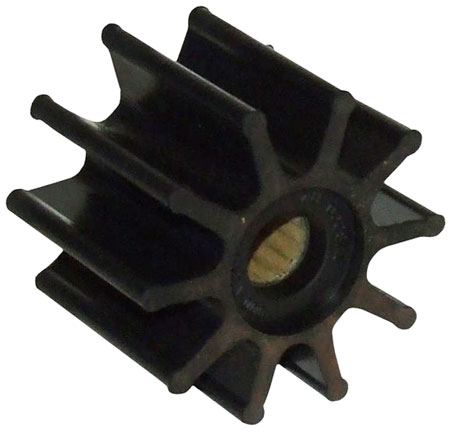Jabsco # 807-1001 Impeller

Jabsco # 807-1001
Jabsco catalog # 807-1001, High Pressure Flexible Flexible Impeller, made of Neoprene. Impeller has 10 blades/fins, and is 3-3/4 inches wide (95mm) x 2-1/2 inches thick (63.5mm), and has a 1 inch (25mm) Brass Spline Drive shaft hub.
Price : $ 360.09
Product Information :
The Jabsco impeller # 807-1001 is a High Pressure flexible rubber impeller, made of Neoprene, with 10 blades/fins, and is 3-3/4 inches wide (95mm) by 2-1/2 inches thick (63.5mm), and has a 1 inch (25mm) Brass Spline Drive shaft hub.
This impeller is made from Neoprene rubber material, which is the standard impeller material used for most flexible impellers. It offers a wide range of chemical resistant properties and has a temperature range of 45 degrees F (7 C) to 180 degrees F (82 C). Liquids compatible with neoprene can be pumped including fresh and salt water solutions and mild chemicals, and is suitable only when small amounts of oil or diesel fuel are present. Oils and fuels will cause the impeller to swell. Do not pump severe solvents or acids. If in any doubt about pump material compatibility, consult Jabsco Chemical resistance table or factory. If corrosive products are pumped, pump life will be prolonged if pump flushed with water at the end of each work cycle. Jabsco flexible impellers are subjected to rigorous quality processes to ensure reliable, efficient and long lasting performance.
NUMBER of BLADES : 10.
SHAFT HUB TYPE : Spline Drive. 
DIMENSIONS : 3-3/4 inches wide (95mm wide), 2-1/2 inches thick/deep (63.5mm), with 1 inch (25mm) Spline Drive shaft hub.